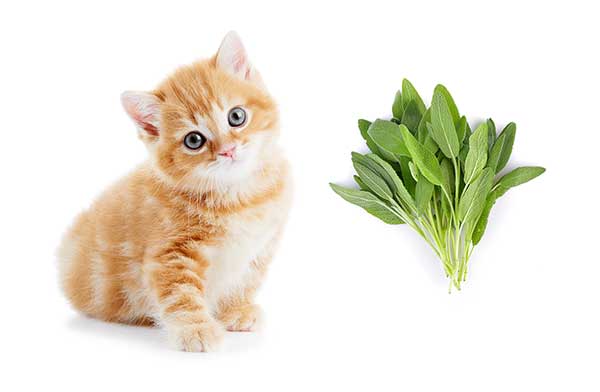Sage safe for cats?
One of the biggest problems with animal parents is – my cat ate sage! Will he be good? As a responsible cat owner, it is only natural to be scared when you walk out of the house and when you come back, you find that your cat has eaten on your sage crops. At such times, you may find yourself worrying, is sage safe for cats to eat? Can cats eat Sage? Know with us below;
The short answer is yes, sage is safe for cats and there should be no health problems immediately. According to experts, you should not worry if you find that your cat has eaten edible leaves or eaten food made with fragrant herbs.
Thus, the fact that sage is safe for cats does not mean that you should simply allow your furry friend to eat the plant and leave it indifferent. Remember that the cat’s digestive system is not designed to handle plant matter. So, Eating sage regularly can cause severe stomach problems, vomiting, diarrhea, stomach pain, and stomach upset. Read on and take the story out and answer all the related questions on the sage and cat.
Can Cats Eat Sage? More About Sage
We have already shown that cats can eat sage, but with caveat. So, you may be wondering, poisonous sage for cats?
Well, as we will find out later, there are extreme cases where this fragrant cooking herb can be toxic to your friend. Before that happens, let’s start introducing the herb forward so you can read from another source. Now, sage, is scientifically known as Salvia officinalis, medicinal, ornamental, and cooking perennial, evergreen shrub.
Sage goes with many other names, including kitchen sage, broadleaf sage, golden sage, common sage, and culinary sage. The shrub is characterized by wood stems and leaves with gray, as well as flowers ranging from blue to purplish.
Sage belongs to the plant family known as Lamiaceae, which is more commonly known as the mint family. The leaves of sage tree can be used medicinally and for cooking as it is, or processed to make essential oils first.
Is Sage Safe for Cats or Poisons? Focusing on Things That Can Help
Sage comes with antiseptic, antispasmodic, astringent, and antihydrotic properties. Your cat can benefit from vegetables as follows;
- 1 – Antiseptic and antimicrobial properties protect your cat from bacterial infections, especially, Salmonella and E. coli.
- 2 – Antispasmodic properties help to stabilize your cat’s muscles, prevent muscle spasms, tremors, and seizures.
Along with its antispasmodic properties, sage is also a vasodilator. This means it restores your cat’s nerve muscles, improving blood circulation and keeping your cat’s heart healthy.
- 3 – The astringent properties of sage make it a recommended herb for cats that treat skin lesions. Medications can cleanse and rejuvenate your cat’s skin by tightening pores and blocking over-secretion of fats.
- 4 – Finally, the antihydrotic capacity of sage makes it an excellent home remedy for cats facing severe sweating. In particular, those with hyperhidrosis.
Sage is also rich in nutrients and can help restore digestive problems within you, such as gassiness, constipation, and diarrhea. In addition, it comes with powerful antifungal properties, making it effective in protecting your cat from fungal infections like ringworms.
How to Use Sage
After looking at the potential health benefits for cats, the next area to be touched is the use of vegetables. Traditionally, sage was used as a tea, ground and added to food, or as a setincture. In the case of cats, you can cut the leaves of the plant and add them directly to your regular or home-cooked cat. Or, you can give them a pin of dried leaves and placed on the ground. Yes, sage leaves are safe enough for cats, either fresh or dried.
There is also the question of the exact method of governance, which is more in line with the design used. Esage leaves and powders can be given orally if you are considering treating a condition such as indigestion or increasing the incontinence of your kitto. You can also apply a extract of esage leaves directly to your cat’s skin to relieve itching and treat sores. Since sage is safe for both indoor and outdoor application, some cat owners may be wondering, oil sage safe for deaf people?
No, sage oil can be toxic to cats. While you can freely use fresh or dried sage leaves on your cats, experts discourage essential oils as they contain ketones.
Different types of Sage
Sage comes in a number of forms, including dried leaves frankincense, and essential oil sage (also known as clary sage). Each of these forms has a different effect on your cat’s body.
White sage safe for cats?
White sage is the dried leaves of the sage tree. And as we have already shown, both are safe and helpful for your cat.
Thus, dried esage leaves only help your cat to the level you set by giving the powder as it is. As you will find, the equation changes suddenly when the dried leaves are burned.
Cats And Burn Sage – Is Sage Hot For Cats?
Warming occurs in two ways. First, the oil can be put on a diffuser or burner and then heated.
Alternatively, leaves and spices can be lit directly to emit smoke. Either way, heat sage provides the most effective treatment for people. But can the same be said of our animal friends? Let’s find out by answering a series of questions about the safety of hot cat sage.
Is sag burning safe for cats?
Burning rice is a tradition that has always been practiced. Other health benefits associated with burning sage include increasing cognition, relieving stress, raising mood and energy levels, and eliminating insomnia. It is important to remember that there are a few scientific research findings showing that heat sage can help cats.

